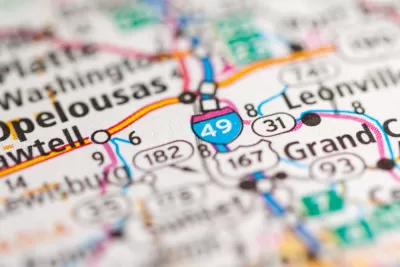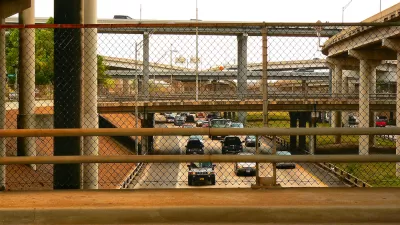An interstate project decades in the making is being investigated by federal authorities for claims that it would perpetuate historically racist land use patterns.

A federal civil rights investigation could alter the design of an interstate expansion project in Lafayette, Louisiana that has been ongoing for four decades. As Stephen Marcantel reports in The Current, if a similar case in Houston is any indication, the I-49 Connector project will likely go forward with changes and mitigation measures.
The investigation is the result of a resident complaint claiming that “the Connector’s path was laid along lines drawn in a 1923 ordinance that bisected Lafayette into white and Black communities” and would perpetuate the inequities created by the city’s historic segregation policies.
The case highlights the ongoing struggle of urban communities to gain recognition of the damage caused by freeway construction, despite federal initiatives like the Reconnecting Communities Act. However, “Some argue the Connector itself represents a way to fix a broken situation along the Thruway. Neighborhoods there have been in limbo for decades, lacking investment while the project hung in the air incomplete.” Shawn Wilson, outgoing director of the Louisiana Department of Transportation and Development and a supporter of the project, wrote in a statement, “While I understand this project will not meet the approval of everyone, and some opponents will go to great lengths to stop it, one thing we know for sure is that doing nothing is an unacceptable alternative.”
Federal officials could, like in the Houston case, require a range of changes to the plan, including “Air quality monitoring, sound barriers for neighborhoods, lighting and sidewalks for improved pedestrian safety, flood mitigation, connecting neighborhoods, improving public transit and creating green spaces.”
FULL STORY: How a civil rights investigation could alter the I-49 Connector

Maui's Vacation Rental Debate Turns Ugly
Verbal attacks, misinformation campaigns and fistfights plague a high-stakes debate to convert thousands of vacation rentals into long-term housing.

Planetizen Federal Action Tracker
A weekly monitor of how Trump’s orders and actions are impacting planners and planning in America.

San Francisco Suspends Traffic Calming Amidst Record Deaths
Citing “a challenging fiscal landscape,” the city will cease the program on the heels of 42 traffic deaths, including 24 pedestrians.

Defunct Pittsburgh Power Plant to Become Residential Tower
A decommissioned steam heat plant will be redeveloped into almost 100 affordable housing units.

Trump Prompts Restructuring of Transportation Research Board in “Unprecedented Overreach”
The TRB has eliminated more than half of its committees including those focused on climate, equity, and cities.

Amtrak Rolls Out New Orleans to Alabama “Mardi Gras” Train
The new service will operate morning and evening departures between Mobile and New Orleans.
Urban Design for Planners 1: Software Tools
This six-course series explores essential urban design concepts using open source software and equips planners with the tools they need to participate fully in the urban design process.
Planning for Universal Design
Learn the tools for implementing Universal Design in planning regulations.
Heyer Gruel & Associates PA
JM Goldson LLC
Custer County Colorado
City of Camden Redevelopment Agency
City of Astoria
Transportation Research & Education Center (TREC) at Portland State University
Jefferson Parish Government
Camden Redevelopment Agency
City of Claremont





























